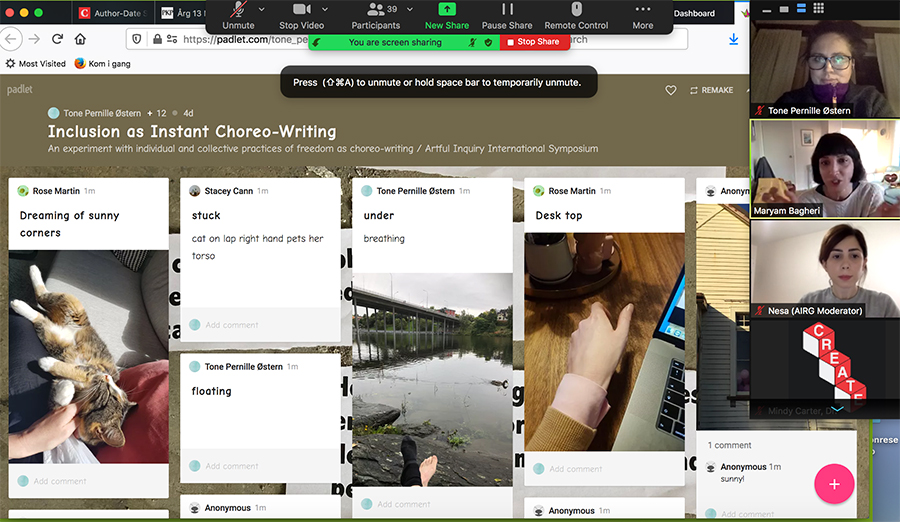Choreographic folding – Research – Department of Teacher Education
Choreographic folding
What if choreography is understood as expansive, performative, poetic and political folding into the world? In the Choreographic Folding Projects at NTNU, Stockholm University of the Arts, Auckland University and DansiT – Centre for Choreography in Trondheim and Mid-Norway, current artistic and academic discourses are looked at and experimented with critically and choreographically to propose various foldings of choreographic practices.
The research group Choreographic folding consists of four artists-researchers-curators-leaders-teachers that all engage in and with choreography-as-research and choreography-as-politics in diverse settings.
Choreographic folding projects
Inclusion as folded choreo-writing, virtual workshop presentation by Maryam Bagheri Nesami and Tone Pernille Østern at the ARTFUL INQUIRY RESEARCH GROUP 3rd International Symposium Connections, October 16-17, 2020, McGill University, Canada.

We are living in a time where we by different reasons are separated from one another, inscribed by different segregating spatializations (for example social, political, class, sexual, racial). The very recent and tangible one was COVID-19, which affected the modes of presence in our places, changing the ways we relate to one another. In this session we focus on how we might alternatively relate to other (human and non-human) bodies in our surrounding places in a more sustainable way; a way which can resist exclusive and segregating power politics. Challenging ideas about choreography, bodies and politics of place, we hope to create a space for artful inquiry of new relations and realities, where we could transit in-between borders and boundaries, flowingly and freely. The session facilitators, coming from the field of choreographic research, see choreo-graphy as a political act of writing, inscribing and locating spatializations. Together with the participants, in the session we experiment with individual and collective practices of freedom as we are reaching an expanded corporeality as folded choreo. The location for inscribing the inclusive spatialization is the platform of padlet. We will share the collaborative, alternative and artistic language as an instant choreo-writing.
About us
Maryam Bagheri Nesami
Maryam Bagheri Nesami (PhD candidate in Dance Studies, University of Auckland) is an Iranian dancer and dance writer, based in Auckland, NZ. Her artistic PhD research focuses on the choreographic practice of solo as a potential site for practicing freedom. Coming from the underground community of dance in Iran, Maryam is interested in choreography as an expanded field to discuss topics such as inclusion, non-violent resistance, strategic negotiations, and micro-politics. At the moment Maryam is working as an artist researcher on the practice-led project, Subtle Corporealities: Propositions of resistance for creative practitioners, funded by Kone Foundation at Helsinki.
Arnhild Staal Pettersen
Arnhild Staal Pettersen is Head of DansiT, Centre for Choreography in Trondheim & Mid-Norway. She is a dance artist in Inclusive Dance Company and she works with choreographic research practice as artistic director for The Dance Theatre. She acknowledges her 20 years of experience from the dance community as one big score of choreographic practice, and her experience as creative and performing dance artist in choreographic processes, is her guidance and methods in leading, curating and facilitating in her daily work at DansiT. Throughout her work, she has a will to challenge the prevailing view of whose stories are told and what bodies are seen on stage and in the art field.
Camilla Reppen
Camilla Reppen is a Swedish dancer, choreographer and dance pedagogue with an interest in choreography as an approach to learning and decentralised perspectives on leadership practice in artistic processes. Working at Stockholm University of the Arts, she is project leader for developing the Bachelor’s Programme in Dance Pedagogy and assistant lecturer in courses on/in leadership and learning in choreographic processes. As a dancer/choreographer Camilla is interested in making the flow of agency, power and influence in leadership practice visible as a way to work with choreography and democratic participation in art.
Tone Pernille Østern
Tone Pernille Østern (Dr. of Arts in Dance) is Professor in Arts Education with a focus on Dance at NTNU Norwegian University of Science and Technology, and Visiting Professor in Dance Education in Contemporary Contexts at University of the Arts in Stockholm. She is active as Artist/Researcher/Teacher, with a special interest in socially engaged art, embodiment and bodily learning, choreographic processes and performative research. As Head of Arts, Physical Education and Arts at NTNU in 2016-20, she utilizes expanded choreographic thinking, sensing and relating as a way of critically exploring, performing and changing leadership. A recent publication is ‘Choreography as Poetic, Pedagogical, and Political Action in Contemporary Times’ in the edited book Art as an Agent for Social Change (Mreiwed, Carter & Mitchell, 2020).
Members of research group
-
Maryam Bagheri Nesami PhD candidate in Dance Studies, University of Auckland
-
Arnhild Staal Pettersen Head of DansiT, Centre for Choreography in Trondheim & Mid-Norway
-
Camilla Reppen Choreographer, dance teacher and project leader at Stockholm University of the Arts
-
Tone Pernille Østern Professor in Arts Education with a focus on Dance, Programme Leader for the Master in Education, Head of Forum for Equity, Inclusion and Diversity
+4797732771 tone.pernille.ostern@ntnu.no Department of Teacher Education
